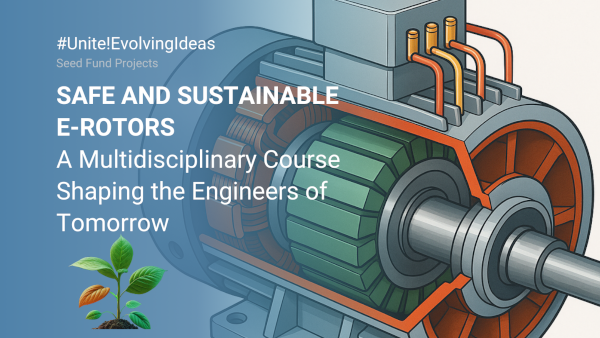Research projects
We are currently taking part in the following ongoing research projects. If you would like to read about other projects we have participated in, click on "See previous projects".
STOR-HY: Innovative storage technology and operations in hydropower
Horizon Europe
As the share of non-dispatchable renewable energy grows, reliable storage solutions become crucial. Due to the variability of these sources, maintaining a stable energy supply becomes challenging and the risk of green energy curtailment is increased. With this in mind, the EU-funded STOR-HY project aims to push to a new frontier of pumped hydro energy storage concept while minimising costs and environmental impacts and increasing societal acceptance. It focuses on extending the lifespan and retrofitting of equipment through smart monitoring and control technologies. It also targets challenging locations, such as seawater and coal mines by developing technologies for harsh operating fluids. With advanced digital tools, the project improves operational efficiency, supporting a more resilient EU energy grid.

FLEXHYBAT: Design and control of flexible hydropower plants by hybridisation with 2nd life batteries
Proyectos de Generación de Conocimiento
Coordinated project between UPC and Universidad de Oviedo, the main objective of this work is to develop a novel methodology to optimise the use and size of battery-based energy storage systems in future hybridization projects in hydropower. This will be relevant for operators and will also contribute to improving future hybridisation projects in hydropower. Our methodology will provide guidance in future hybridisation projects considering the capacity of the unit, ancillary services to provide, grid scenarios (with massive entrance of new renewable effects) and negative effects of the climate change (extreme droughts that will cause extreme low water heads and flowrates).

MD-FRANCIS: Modelling and Diagnostic of Anomalies in Francis Turbines
Alliance Advantage / InnovÉE
In this project led by Université Laval (Québec), the operational impacts of anomalies in the hydraulic channels of Francis turbines are studied to improve their detection and diagnosis. A scale model Francis turbine, mirroring a turbine in operation in Canada, will be modified to replicate specific anomalies and examine their impact on the fluid-structure dynamics of the turbine. Structural measurements and simulations will be carried out to develop improved monitoring technologies and turbine operational life. MD-Francis is a joint research effort by the members of the Hydraulic Machine Research Consortium, a partnership which currently includes four universities (Université Laval, Polytechnique Montréal, École de Technologie Supérieure, Polytechnical University of Catalonia) and six industrial partners (Hydro-Québec, ANDRITZ Canada, GE Vernova, Voith Hydro, EDF, and Vattenfall).

Hydropower sustainability: Pioneering health monitoring for hydraulic turbines in the face of climate change
SPARC (Scheme for Promotion of Academic and Research Collaboration)
Hydropower development in the Himalayas, Alps, and Andes regions encounters a substantial impediment due to abrasive sediment particles, resulting in gradual material erosion within hydraulic turbines. Climate change factors like the retreat of glaciers and permafrost, increased rainfall extremes, and higher sediment yields exacerbate this erosion issue. Also, varying load conditions introduce an additional challenge, as cavitation-induced erosion further impacts the overall lifespan of turbines. This project is dedicated to a comprehensive examination and health monitoring of hydropower turbines facing erosion from both cavitation and abrasive sediment. It aims to establish a reference model and sediment flow conditions based on hydropower plants in the Indian Himalayas, explicitly focusing on plants like Dhakrani and Maneri Bhali I and II. A collaborative effort between teams from Indian Institute of Technology Roorkee, National Institute of Technology Warangal and CDIF from UPC will use numerical simulations to analyse erosion and cavitation patterns under diverse conditions.

Hidroaguagrún, innovating in mini hydroelectric power generation with a people's energy transition, water governance and circular economy approach
AECID Innovación 2024
Aiming at a cooperative energy transition that is aligned with socioenvironmental justice in the Intag-Toisán area (Imbabura, Ecuador), this project implements an innovative solution: Hidroaguagrún, a mini power generation plant (300kW) that uses PaT (Pump as Turbine) technology by escalating a successful pilot tested for the first time in the country. Through integrating renewable energies to the everyday life of the local community, the project contributes to the area’s sustainable and inclusive socioeconomic development.

Safe and sustainable E-ROTORS: shaping the engineers of tomorrow
Unite! Seed Fund
The Safe and Sustainable E-ROTORS project is a multidisciplinary joint teaching initiative funded by the Unite! Seed Fund, designed to prepare Master’s students for the complex demands of Industry 5.0. Led by a consortium of six European technical universities (including Politecnico di Torino, Aalto University, TU Darmstadt, TU Graz, UPC, and Wroclaw Tech), the project integrates diverse fields such as product development, signal processing, AI, and cybersecurity to focus on the safety and sustainability of rotating systems. By offering a 10-ECTS modular course for the 2025-2026 academic year, the initiative emphasizes a "learning-by-doing" approach, combining digital modeling and experimental activity to bridge the gap between theoretical research and industrial practice in the ecological and digital transition.

Share: